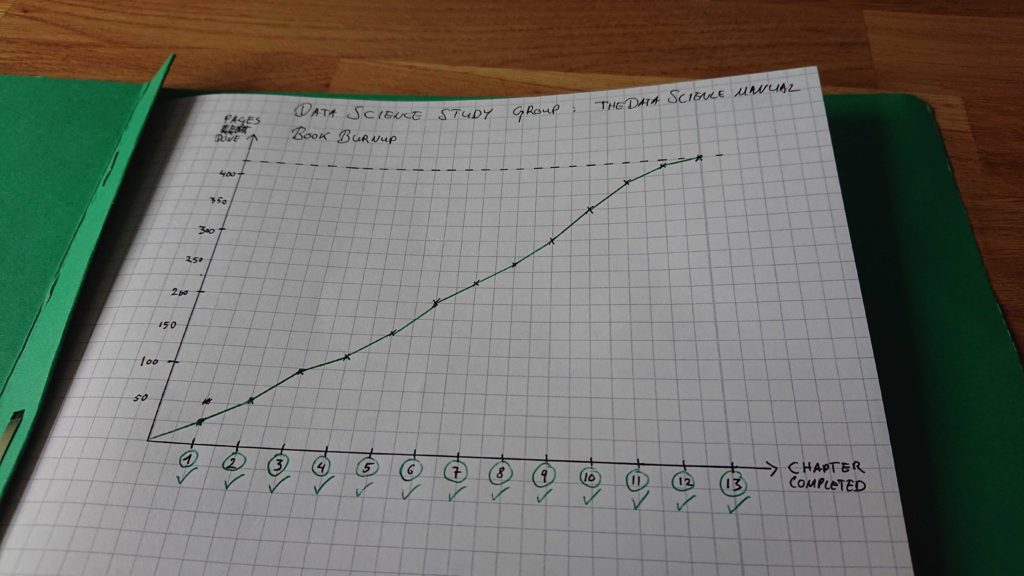Earlier this year, a few friends and I have started a remote Data Science study group. Since then, we’ve met once a week to talk about Data Science, Machine Learning, and Python. Our aim is to get better, together. In this article, I want to share how we’ve set up the group and what has been working for us so far.
Why?
There are a plethora of reasons why running a remote study group for any topic is a good idea. Here’s what motivated me.
- Reach personal goals. Improving and practicing my Data Science and Machine Learning skills outside of work has been part of the goals I’ve set for myself at the beginning of 2020.
- Healthy peer pressure. Social pressure works, at least for me: I know that I would have a hard time sticking to a weekly cadence of studying on my own, but if a peer group holds me accountable to at least show up, I would always try to have something to show for it.
- Share knowledge. If you find a group of motivated people, they will bring different experiences and questions to the round. This leads to healthy discussions and skill sharing.
- Study from home. Remote study groups are very compatible with a pandemic lifestyle.
Find a group and make it easy to commit for everyone
To get started and get others on board, I made two choices to reduce the initial friction of getting things running:
- Set the initial topic. “I am going to read the following book on Data Science in the next few weeks. It’s available as a free PDF. Do you want to join me?”
- Reasonable commitment. We’ll meet once a week for a video call of 1 hour. It won’t ever take longer.
This was easy to say “Yes” to and three friends immediately joined me.

Start simple: Read a book together
The first few weeks, we’ve read a book together. The goal was to start broad with a high-level overview. Our first book was Steven Skiena’s The Data Science Design Manual, which is available for free from Springer.
The book lends itself well for this purpose because it goes over central Data Science topics at a conceptual level. In some chapters, Skiena dives into algorithms, but not too deep. As an overview to get our group started, it was a good choice. Moving forward, most of us agreed to pick a book that has more in-depth explanations and code examples to encourage trying things out.
We’ve read 1-2 chapters per week, depending on their length and complexity. In our weekly discussion, we went through our notes and shared in turn, asking: “What’s one thing you’ve learned from this chapter?” These discussions easily filled 60 minutes and I think it never got boring.
Intensified Learning: Code together
It’s hard to argue that trying things out yourself will lead to deeper understanding, so we’ve tried from the start to incorporate that. While reading, we would experiment with one of the mentioned algorithms or look at a dataset linked from one of the chapters. Having finished the book, we continued that practice: Everyone picked a personal data project to work on, and we updated each other once a week. These data projects were all motivated by challenges available on Kaggle, and we had good fun toying around with them.

Learning with Pandas
We’ve recently moved on to a new book: Wes McKinney’s Python for Data Analysis. As the Pandas library is the de-facto standard for data handling in Python, a book by the author of Pandas seemed like the right choice. In the group, we have different levels of experience with Pandas, but revisiting the foundation and strengthening the practical skills were favored by all of us. As this book is heavy on code examples, we hope to get a good balance of reading and coding in as we move along.
Moving forward
Reading a book, working on mini-projects, starting with the second book. It almost feels like we’ve entered “Season 3” of our little Data Science journey now. So far, I’ve learned a lot as an individual, and I think as a group we are motivated to keep going, probably experimenting with the format in the future.
The experience of launching a remote study group has been great so far. If you have a topic you want to explore more thoroughly, take this as an encouragement: In the age of video calls and free online resources on every topic imaginable, collaborative learning has become as easy as never before.
